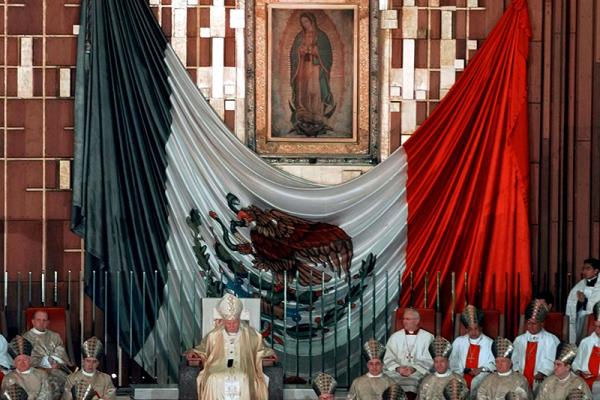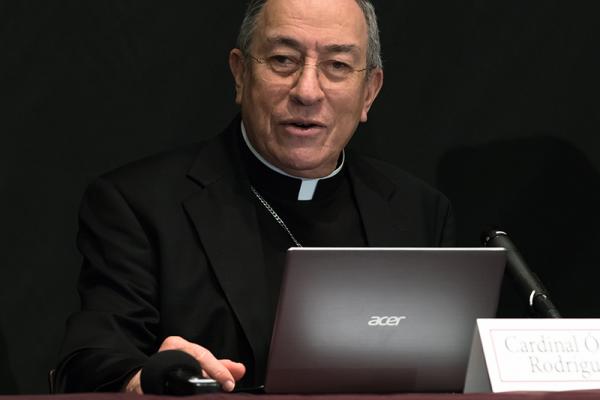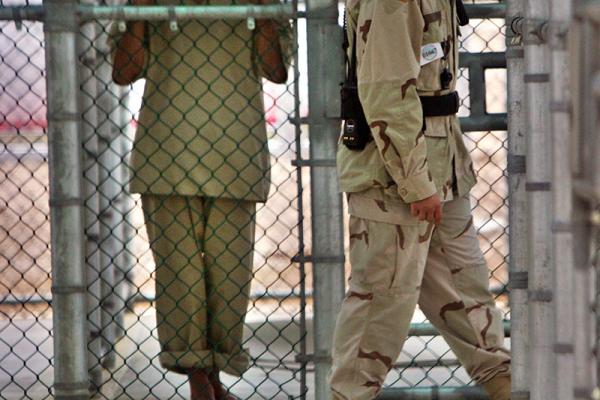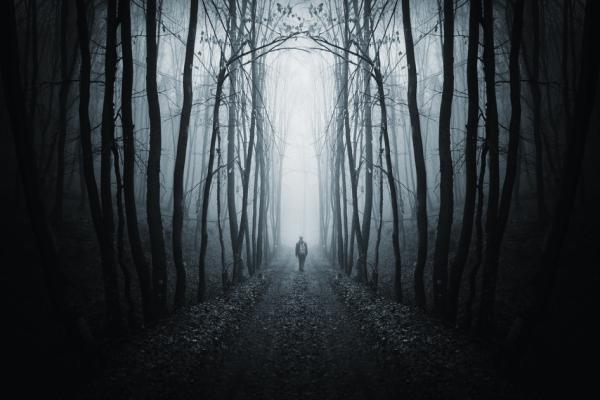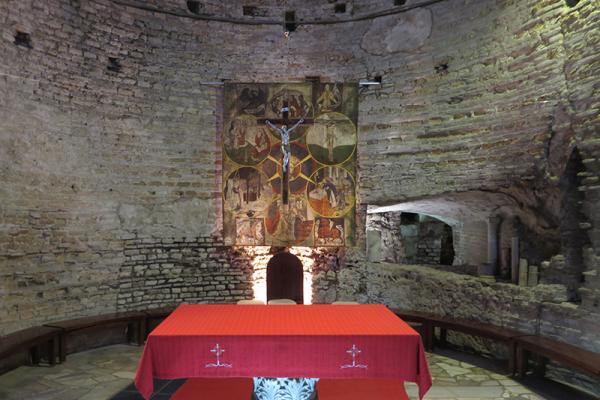A Honduran cardinal who is a top adviser to Pope Francis said he expects the pontiff to travel to Mexico’s border with the U.S. when he visits that country in February.
“I think it’s almost sure he will go to the border. I don’t know which cities,” said Cardinal Oscar Rodriguez Maradiaga, who heads a special council of nine cardinals that Francis set up in 2013 to advise him on reforming the Vatican.
“Knowing him, he will go … I don’t know yet where,” Rodriguez said in an interview on Nov. 3 before taking part in a Fordham University panel on “Laudato Si’,” the pope’s groundbreaking encyclical on the moral duty to protect the environment.
Religious institutions have, at times, been at the forefront of progress by engaging society with forceful spiritual leadership. The engagement of Cesar Chavez and the United Farm Workers grape boycott in the 1960s, for example, was part phenomenal leadership, part righteous struggle.
And while most Americans know the pivotal impact of Rev. Dr. Martin Luther King, Jr., and the Southern Christian Leadership Conference in the Civil Rights Movement, there were many other leaders who held prominent roles in similar religiously-inspired movements. Rev. Dr. Anna Howard Shaw (1847-1919), for example, overcame enormous discrimination and was not only ordained as a minister, but also earned a medical degree from Boston University.
Shaw was a formidable speaker, and lectured throughout the United States and Europe in favor of women’s suffrage, temperance, and progressive causes she believed would relieve the exploitation of women.
Despite intense opposition from some conservatives and new revelations of financial scandals in the Vatican, Pope Francis is at peace with the reformist course he has set for the Catholic Church, according to a cardinal who is a leading adviser to the pontiff.
Honduran Cardinal Oscar Rodriguez Maradiaga also said that the latest reports of excessive spending and political maneuvering by officials of the Roman Curia only confirm the need to press ahead with an overhaul of the papal bureaucracy.
“You know, everybody that is trying to make good will have opposition,” Rodriguez said Nov. 3 after a conference at Fordham University on Francis’ environmental agenda.
How far does the U.S. military have to go to provide religious accommodations for locked-up al-Qaida terrorism suspects?
That’s the question before a military judge who is weighing whether female guards should be banned from touching detainees at Guantanamo Bay, Cuba.
Five of the military’s “high-value” detainees asked the judge Oct. 30 to permanently forbid women guards from touching the prisoners. Their Muslim traditions, they say, prohibit women other than their wives or relatives from touching them.
But the two female guards who sometimes shackle or escort the detainees say a ban on touching violates their equal employment rights. They have won support from members of Congress and the Obama administration who called the ban “outrageous.”
In church last spring, our children learned the song, “Jesu, Jesu Fill Us with Your Love.” It includes the line, “neighbors are nearby and far away,” which gave our five-year-old son pause.
“Are neighbors far away?” he asked at breakfast recently.
“No,” I said.
“They’re nearby.”
When I bought eyeglasses for the first time, I suddenly and dramatically discovered the clarity I had been missing. But I also had to be careful walking down stairs, as I had a hard time judging depth. I got headaches from the intensity of my newfound vision. I had to adjust to a new way of seeing.
Recently, I invited Albert Rizzi to co-preach a sermon with me. He had unexpectedly lost his sight in 2006 at the age of 41. In 2009, he launched a non-profit company advocating that all blind persons be entitled to acceptance and freedom from discrimination. He works to develop accessible computer accounting software to help reduce the national 60 percent unemployment rate among the blind.
Rizzi’s blindness became a national news story in 2013 when he and his guide dog, Doxy (short for doxology), were ejected from an airplane because he could not get Doxy to crawl under the seat for takeoff. They had been on the tarmac for nearly two hours, and the dog had become restless. In protest of Albert and Doxy’s eviction, the 45 other passengers joined Rizzi and Doxy in departing the plane and the flight was cancelled.
I was at a retreat recently with a facilitator who is known for pushing the envelope a bit regarding Roman Catholic Church teaching. The question posited throughout the weekend: Whom should we accept as brothers and sisters in faith?
During the retreat someone asked the facilitator how we should approach ministry in our churches in regard to the gay and lesbian community. A fellow retreatant replied, “Invite us to speak for ourselves.”
Who better to speak on challenging topics than those who are living inside the issue?
The U.S. Air Force plans to build six new helipads in the jungle as part of a deal to give close to one-half of the training center acreage back to Japan. Yet right in the middle of these proposed helipad sites lies Takae, a village of about 150 residents. They are the people who will suffer the increased air traffic that is sure to result if the helipads are built. They will also have to abide the possibility of a crash — there have been at least 43 aircraft accidents since 1972, and in 1959 a plane carrying two missiles crashed into a school, killing 17 people and injuring 210.
Now that the air force has a new toy, the MV-22 Osprey helicopter, there have been a lot of trainee pilots going out on practice runs. Unfortunately, the Osprey has established an abysmal safety record compared to earlier models. Its “safety” features are not, in fact, safe for potential bystanders.
Takae residents also believe that the U.S. military would like to use their village as part of its training exercises, an idea that doesn’t seem so farfetched after considering what happened during the Vietnam War. At that time, the U.S. military built a “dummy” village in the jungle and forcefully conscripted Takae residents, one as young as six years old, to wear black clothing and carry on as though they were living in a Vietcong stronghold. The conscripted residents were even required to stage mock attacks from the village.
As the political stage gets set for the 2016 U.S. presidential election, how should Christians engage?
One unexpectedly relevant guide can be found in the book of Judges, which more than any other book in the Bible, describes a divinely-inspired form of leadership similar to our own. Between the era in which God spoke through Moses, and the one in which God worked through kings like David, came an era — lasting over four centuries — during which God raised up a series of individuals who had no predefined lineage, accomplishment, or gender marking them as leadership material. These judges were not judicial so much as military leaders, fulfilling a role strikingly similar to that of the American president.
Another notable commonality Americans share with the Israelites of Judges is the crisis in which we find ourselves. Apostasy, from the Greek word apostasia, means “an abandonment of one’s previous faith.” Then as now, a nation was turning away from God.
The document would become known as the Pact of the Catacombs, and the signers hoped it would mark a turning point in church history.
Instead, the Pact of the Catacombs disappeared, for all intents and purposes.
It is barely mentioned in the extensive histories of Vatican II, and while copies of the text are in circulation, no one knows what happened to the original document. In addition, the exact number and names of the original signers is in dispute, though it is believed that only one still survives: Luigi Bettazzi, nearly 92 years old now, bishop emeritus of the Italian diocese of Ivrea.
